Since 用法完全总结
- 格式:doc
- 大小:45.50 KB
- 文档页数:4
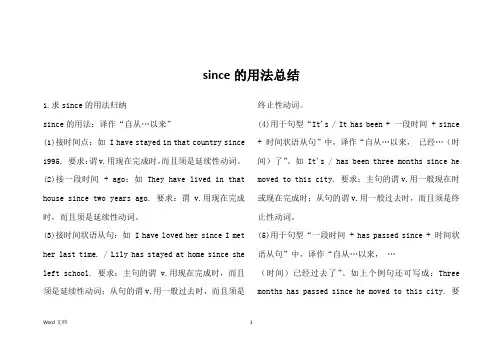
since的用法总结1.求since的用法归纳since的用法:译作“自从…以来”(1)接时间点:如 I have stayed in that country since 1995. 要求:谓v.用现在完成时,而且须是延续性动词。
(2)接一段时间 + ago:如 They have lived in that house since two years ago. 要求:谓v.用现在完成时,而且须是延续性动词。
(3)接时间状语从句:如 I have loved her since I met her last time. / Lily has stayed at home since she left school. 要求:主句的谓v.用现在完成时,而且须是延续性动词;从句的谓v.用一般过去时,而且须是终止性动词。
(4)用于句型“It's / It has been + 一段时间 + since + 时间状语从句”中,译作“自从…以来,已经…(时间)了”。
如 It's / has been three months since he moved to this city. 要求:主句的谓v.用一般现在时或现在完成时;从句的谓v.用一般过去时,而且须是终止性动词。
(5)用于句型“一段时间 + has passed since + 时间状语从句”中,译作“自从…以来,…(时间)已经过去了”。
如上个例句还可写成:Three months has passed since he moved to this city. 要Word文档 1求:主句的谓v.用现在完成时,而且动词必须是has passed;从句的谓v.用一般过去时,而且须是终止性动词。
(6)注:当since用于否定句时,主句的谓v.可以是终止性动词。
如 He hasn't seen the film since last month.(7)相关词组:“从那时起”:ever since、since then、from then on.注:ever since作为一个词组,放句尾可单独使用。
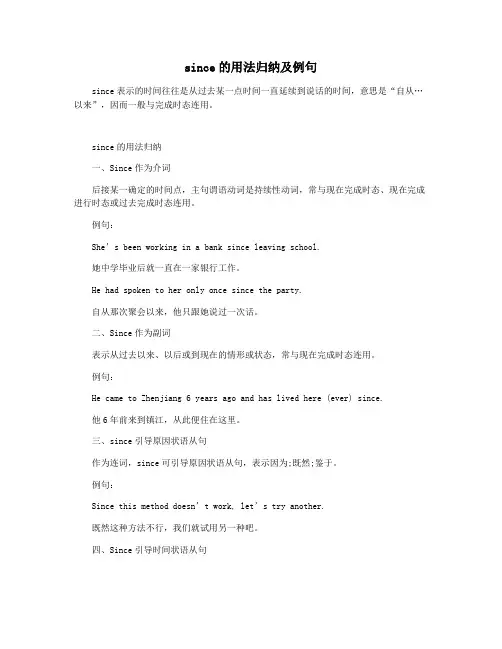
since的用法归纳及例句since表示的时间往往是从过去某一点时间一直延续到说话的时间,意思是“自从…以来”,因而一般与完成时态连用。
since的用法归纳一、Since作为介词后接某一确定的时间点,主句谓语动词是持续性动词,常与现在完成时态、现在完成进行时态或过去完成时态连用。
例句:She’s been working in a bank since leaving school.她中学毕业后就一直在一家银行工作。
He had spoken to her only once since the party.自从那次聚会以来,他只跟她说过一次话。
二、Since作为副词表示从过去以来、以后或到现在的情形或状态,常与现在完成时态连用。
例句:He came to Zhenjiang 6 years ago and has lived here (ever) since.他6年前来到镇江,从此便住在这里。
三、since引导原因状语从句作为连词,since可引导原因状语从句,表示因为;既然;鉴于。
例句:Since this method doesn’t work, let’s try another.既然这种方法不行,我们就试用另一种吧。
四、Since引导时间状语从句1、若since引导的状语从句的谓语是终止性动词的过去时,则从句表示的时间是“从动作开始的那一时刻起”。
例句:He has studied very hard since he came to our school.自从他来到我们学校,他学习就非常努力。
2、若since引导的状语从句的谓语动词是持续性动词或表示状态动词的过去时时,则从句表示的时间是“从动作或状态结束时算起”。
例句:I haven’t heard any noise since I slept.我醒后还未听到任何声音。
3、若since引导的状语从句的谓语为持续性动词的现在完成时,则表示动作和状态延续到现在(说话时刻),其表示的时间的起点应从动作发生之时算起。

since的时态和用法**一、since的基本用法**1. **作为介词**- Since the accident, he has been really scared of driving. (自从那次事故以来,他真的很害怕开车。
) 这就像一场暴风雨过后,花朵就变得小心翼翼地面对风了。
- I haven't seen her since last year. (自从去年以来我就没见过她。
) 哎,感觉时间过得好快,就像流水冲走了我们见面的机会。
- Since his birthday, he has had a new attitude towards life. (自从他生日之后,他有了一种新的生活态度。
) 你看,生日就像一个新的起点,能改变很多东西呢。
2. **作为连词**- Since you are here, why don't we have a party? (既然你在这儿,我们为什么不举办个聚会呢?) 这就好比天上掉馅饼了,咱们得抓住这个好机会呀。
- Since he left school, he has been working hard to make a living. (自从他离开学校,他就一直在努力工作谋生。
) 这就像一只离巢的小鸟,必须努力飞翔才能生存。
- She has been really happy since she got married. (自从她结婚以来,她一直非常幸福。
) 婚姻对于她来说,就像是打开了幸福的魔法盒子。
**二、since的固定搭配**1. **ever since**- Ever since I met you, my life has changed for the better. (自从我遇见你,我的生活变得更好了。
) 就像黑暗中突然出现了一道光,你照亮了我的生活。
- He has been a bookworm ever since he was a child. (他从小就是个书虫。
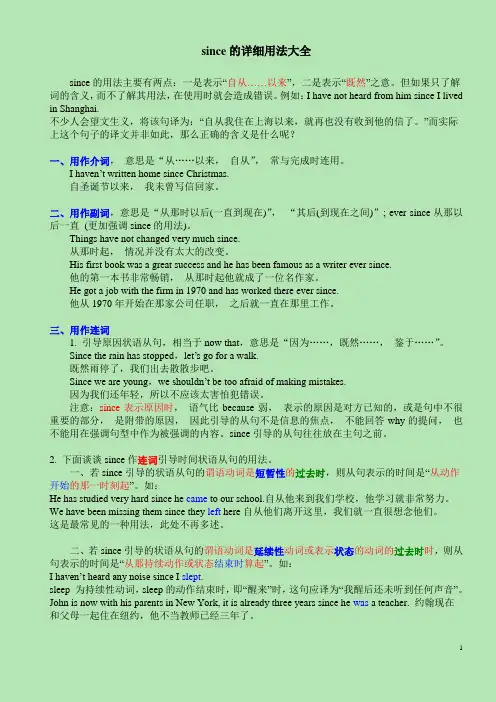
since的详细用法大全since的用法主要有两点:一是表示“自从……以来”,二是表示“既然”之意。
但如果只了解词的含义,而不了解其用法,在使用时就会造成错误。
例如:I have not heard from him since I lived in Shanghai.不少人会望文生义,将该句译为:“自从我住在上海以来,就再也没有收到他的信了。
”而实际上这个句子的译文并非如此,那么正确的含义是什么呢?一、用作介词,意思是“从……以来,自从”,常与完成时连用。
I haven’t written home since Christmas.自圣诞节以来,我未曾写信回家。
二、用作副词,意思是“从那时以后(一直到现在)”,“其后(到现在之间)”; ever since从那以后一直(更加强调since的用法)。
Things have not changed very much since.从那时起,情况并没有太大的改变。
His first book was a great success and he has been famous as a writer ever since.他的第一本书非常畅销,从那时起他就成了一位名作家。
He got a job with the firm in 1970 and has worked there ever since.他从1970年开始在那家公司任职,之后就一直在那里工作。
三、用作连词1. 引导原因状语从句,相当于now that,意思是“因为……,既然……,鉴于……”。
Since the rain has stopped,let’s go for a walk.既然雨停了,我们出去散散步吧。
Since we are young,we shouldn’t be too afraid of making mistakes.因为我们还年轻,所以不应该太害怕犯错误。
注意:since表示原因时,语气比because弱,表示的原因是对方已知的,或是句中不很重要的部分,是附带的原因,因此引导的从句不是信息的焦点,不能回答why的提问,也不能用在强调句型中作为被强调的内容。
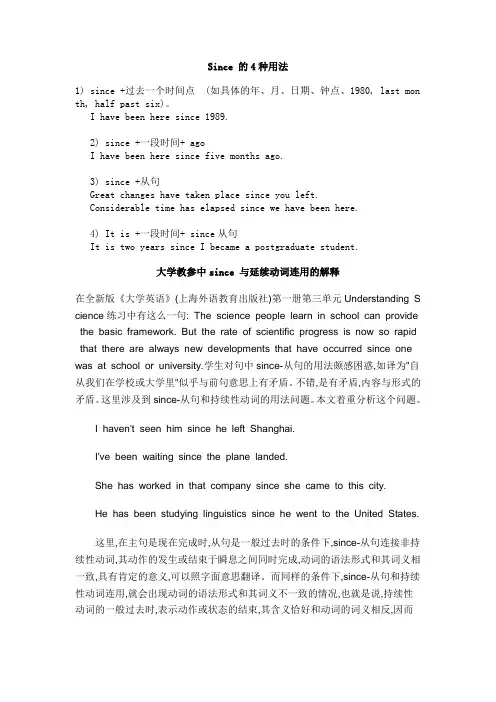
Since 的4种用法1) since +过去一个时间点(如具体的年、月、日期、钟点、1980, last mon th, half past six)。
I have been here since 1989.2) since +一段时间+ agoI have been here since five months ago.3) since +从句Great changes have taken place since you left.Considerable time has elapsed since we have been here.4) It is +一段时间+ since从句It is two years since I became a postgraduate student.大学教参中since 与延续动词连用的解释在全新版《大学英语》(上海外语教育出版社)第一册第三单元Understanding S cience练习中有这么一句: The science people learn in school can provide the basic framework. But the rate of scientific progress is now so rapid that there are always new developments that have occurred since one was at school or university.学生对句中since-从句的用法颇感困惑,如译为"自从我们在学校或大学里"似乎与前句意思上有矛盾。
不错,是有矛盾,内容与形式的矛盾。
这里涉及到since-从句和持续性动词的用法问题。
本文着重分析这个问题。
I haven't seen him since he left Shanghai.I've been waiting since the plane landed.She has worked in that company since she came to this city.He has been studying linguistics since he went to the United States.这里,在主句是现在完成时,从句是一般过去时的条件下,since-从句连接非持续性动词,其动作的发生或结束于瞬息之间同时完成,动词的语法形式和其词义相一致,具有肯定的意义,可以照字面意思翻译。
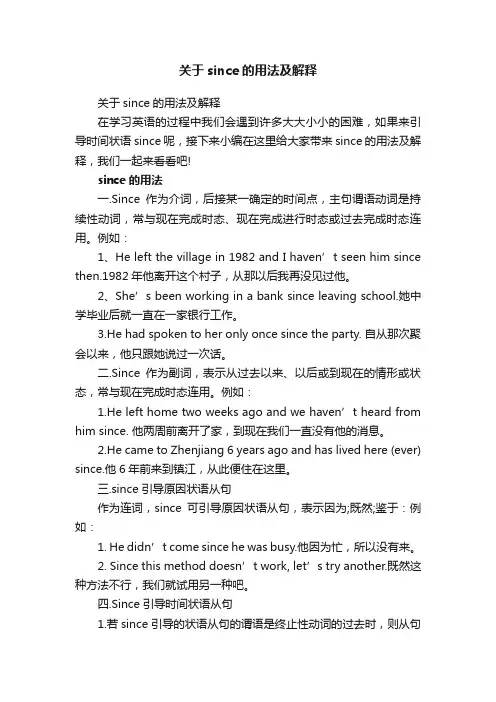
关于since的用法及解释关于since的用法及解释在学习英语的过程中我们会遇到许多大大小小的困难,如果来引导时间状语since呢,接下来小编在这里给大家带来since的用法及解释,我们一起来看看吧!since的用法一.Since作为介词,后接某一确定的时间点,主句谓语动词是持续性动词,常与现在完成时态、现在完成进行时态或过去完成时态连用。
例如:1、He left the village in 1982 and I haven’t seen him since then.1982年他离开这个村子,从那以后我再没见过他。
2、She’s been working in a bank since leaving school.她中学毕业后就一直在一家银行工作。
3.He had spoken to her only once since the party. 自从那次聚会以来,他只跟她说过一次话。
二.Since作为副词,表示从过去以来、以后或到现在的情形或状态,常与现在完成时态连用。
例如:1.He left home two weeks ago and we haven’t heard from him since. 他两周前离开了家,到现在我们一直没有他的消息。
2.He came to Zhenjiang 6 years ago and has lived here (ever) since.他6年前来到镇江,从此便住在这里。
三.since引导原因状语从句作为连词,since可引导原因状语从句,表示因为;既然;鉴于:例如:1. He didn’t c ome since he was busy.他因为忙,所以没有来。
2. Since this method doesn’t work, let’s try another.既然这种方法不行,我们就试用另一种吧。
四.Since引导时间状语从句1.若since引导的状语从句的谓语是终止性动词的过去时,则从句表示的时间是“从动作开始的那一时刻起”。
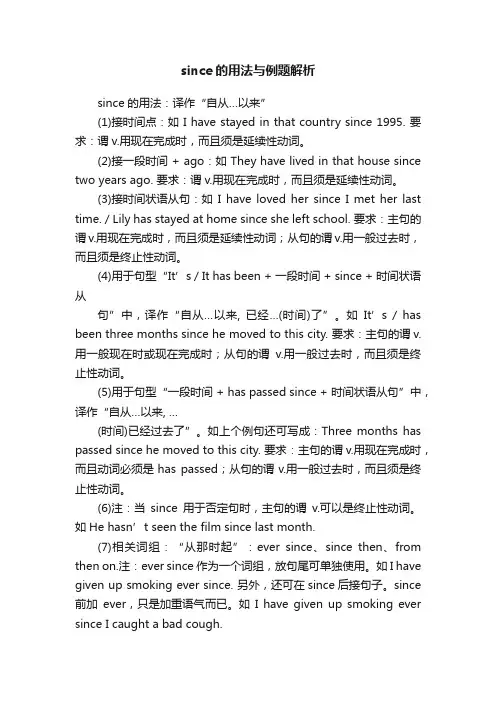
since的用法与例题解析since的用法:译作“自从…以来”(1)接时间点:如 I have stayed in that country since 1995. 要求:谓v.用现在完成时,而且须是延续性动词。
(2)接一段时间 + ago:如 They have lived in that house since two years ago. 要求:谓v.用现在完成时,而且须是延续性动词。
(3)接时间状语从句:如I have loved her since I met her last time. / Lily has stayed at home since she left school. 要求:主句的谓v.用现在完成时,而且须是延续性动词;从句的谓v.用一般过去时,而且须是终止性动词。
(4)用于句型“It’s / It has been + 一段时间 + since + 时间状语从句”中,译作“自从…以来, 已经…(时间)了”。
如It’s /has been three months since he moved to this city. 要求:主句的谓v.用一般现在时或现在完成时;从句的谓v.用一般过去时,而且须是终止性动词。
(5)用于句型“一段时间 + has passed since + 时间状语从句”中,译作“自从…以来, …(时间)已经过去了”。
如上个例句还可写成:Three months has passed since he moved to this city. 要求:主句的谓v.用现在完成时,而且动词必须是has passed;从句的谓v.用一般过去时,而且须是终止性动词。
(6)注:当since用于否定句时,主句的谓v.可以是终止性动词。
如He hasn’t seen the film since last month.(7)相关词组:“从那时起”:ever since、since then、from then on.注:ever since作为一个词组,放句尾可单独使用。
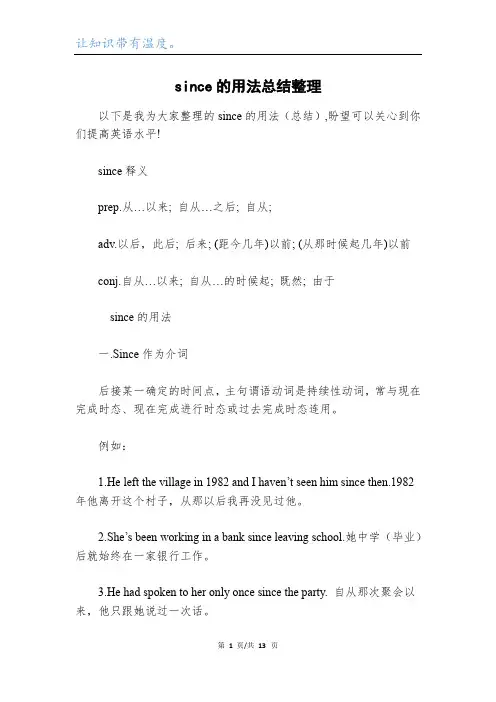
since的用法总结整理以下是我为大家整理的since的用法(总结),盼望可以关心到你们提高英语水平!since释义prep.从…以来; 自从…之后; 自从;adv.以后,此后; 后来; (距今几年)以前; (从那时候起几年)以前conj.自从…以来; 自从…的时候起; 既然; 由于since的用法一.Since作为介词后接某一确定的时间点,主句谓语动词是持续性动词,常与现在完成时态、现在完成进行时态或过去完成时态连用。
例如:1.He left the village in 1982 and I haven’t seen him since then.1982年他离开这个村子,从那以后我再没见过他。
2.She’s been working in a bank since leaving school.她中学(毕业)后就始终在一家银行工作。
3.He had spoken to her only once since the party. 自从那次聚会以来,他只跟她说过一次话。
二.Since作为副词表示从过去以来、以后或到现在的情形或状态,常与现在完成时态连用。
例如:1.He left home two weeks ago and we haven’t heard from him since. 他两周前离开了家,到现在我们始终没有他的消息。
2.He came to Zhenjiang 6 years ago and has lived here (ever) since.他6年前来到镇江,从今便住在这里。
三.since引导缘由状语从句作为连词,since可引导缘由状语从句,表示由于;既然;鉴于:例如:1.He didn’t come since he was busy.他由于忙,所以没有来。
2.Since this method doesn’t work,let’s try anoter.既然这种(方法)不行,我们就试用另一种吧。
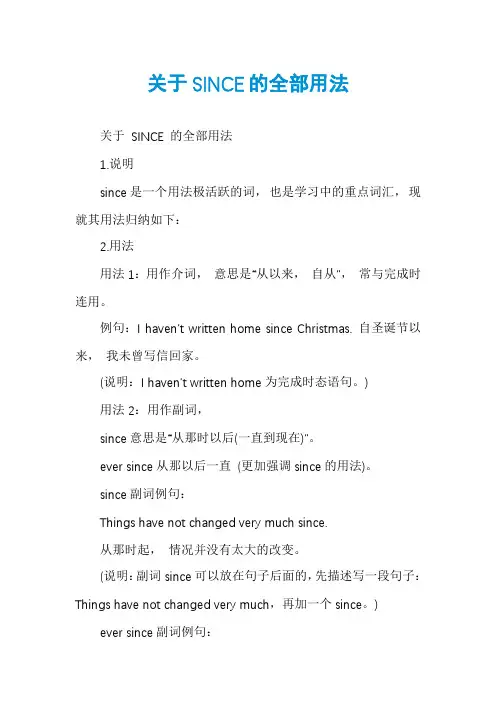
关于SINCE的全部用法关于SINCE 的全部用法1.说明since是一个用法极活跃的词,也是学习中的重点词汇,现就其用法归纳如下:2.用法用法1:用作介词,意思是“从以来,自从”,常与完成时连用。
例句:I haven’t written home since Christmas. 自圣诞节以来,我未曾写信回家。
(说明:I haven’t written home为完成时态语句。
)用法2:用作副词,since意思是“从那时以后(一直到现在)”。
ever since从那以后一直(更加强调since的用法)。
since副词例句:Things have not changed very much since.从那时起,情况并没有太大的改变。
(说明:副词since可以放在句子后面的,先描述写一段句子:Things have not changed very much,再加一个since。
) ever since副词例句:H is first book was a great success and he has been famous as a writer ever since.他的第一本书非常畅销,从那时起他就成了一位名作家。
(说明:副词ever since放在了句子后面。
)用法3:用作连词意思是“因为,既然,鉴于”。
例句:Since the rain has stopped,let’s go for a walk.既然雨停了,我们出去散散步吧。
年华原创,空间还很多关于学习英语的日志,欢迎观看学习。
英语中to和for的用法,如何简单区别使用?for更注重目的,表示有一方受益,to更注重指向。
to接不定式动词原形,for接动词ing形式。
一般情况下, to后面常接对象; for后面表示原因与目的为多。
for和to的简单区别for和to这两个介词,意义丰富,用法复杂。
这里仅就它们主要用法进行比较。
1. 表示各种“目的”What do you study English for?你为什么要学英语?She went to france for holiday.她到法国度假去了。
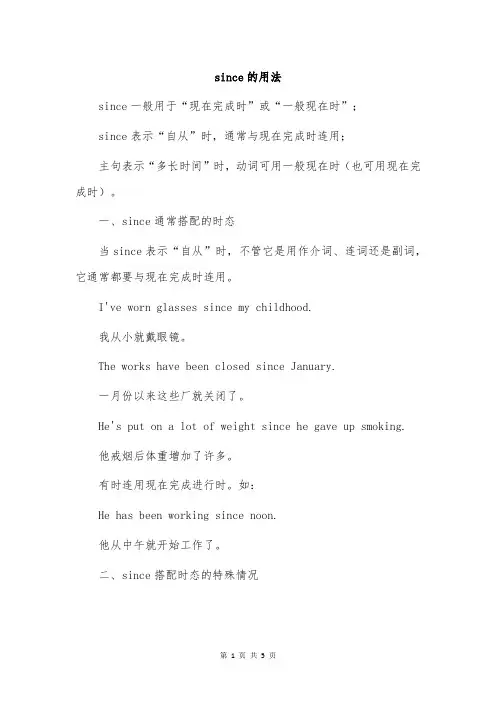
since的用法since一般用于“现在完成时”或“一般现在时”;since表示“自从”时,通常与现在完成时连用;主句表示“多长时间”时,动词可用一般现在时(也可用现在完成时)。
一、since通常搭配的时态当since表示“自从”时,不管它是用作介词、连词还是副词,它通常都要与现在完成时连用。
I've worn glasses since my childhood.我从小就戴眼镜。
The works have been closed since January.一月份以来这些厂就关闭了。
He's put on a lot of weight since he gave up smoking.他戒烟后体重增加了许多。
有时连用现在完成进行时。
如:He has been working since noon.他从中午就开始工作了。
二、since搭配时态的特殊情况虽然since通常要与现在完成时连用,但在以下情况,它也可以连用除完成时态以外的其他时态:1. 当主句表示“多长时间”时,动词可用一般现在时(当然也可用现在完成时)。
如:It's a long time since I met you last.好久不见了。
It's just a week since we arrived here.我们到这里才一个星期。
以上各句的it is也可换成 it has been,不过在口语或非正式文体中,用一般现在时的情形比较普遍。
2. 当主句谓语动词为seem等连系动词时。
如:It seems like years since we last met.我们似乎几年未见面了。
It seems like years since I last saw you.从上次见到你以来好像已经有许多年了。
3. 当主句和从句表示情况“变化”时。
如:She doesn't come round to see us so much since her marriage.自从结了婚,她不怎么过来看我们了。
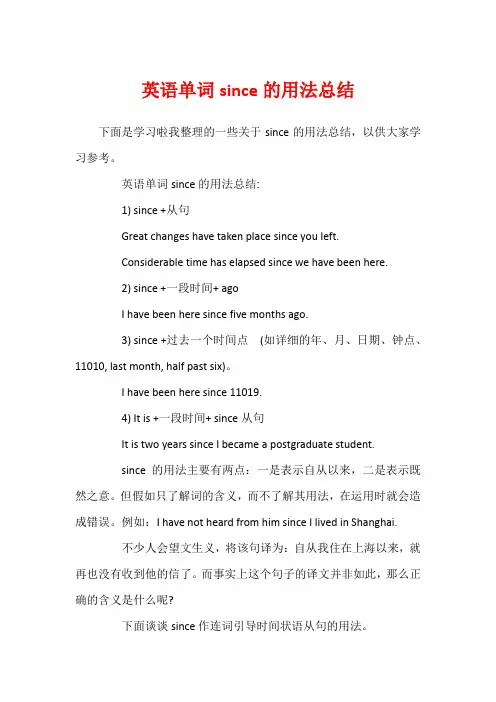
英语单词since的用法总结下面是学习啦我整理的一些关于since的用法总结,以供大家学习参考。
英语单词since的用法总结:1) since +从句Great changes have taken place since you left.Considerable time has elapsed since we have been here.2) since +一段时间+ agoI have been here since five months ago.3) since +过去一个时间点(如详细的年、月、日期、钟点、11010, last month, half past six)。
I have been here since 11019.4) It is +一段时间+ since从句It is two years since I became a postgraduate student.since的用法主要有两点:一是表示自从以来,二是表示既然之意。
但假如只了解词的含义,而不了解其用法,在运用时就会造成错误。
例如:I have not heard from him since I lived in Shanghai.不少人会望文生义,将该句译为:自从我住在上海以来,就再也没有收到他的信了。
而事实上这个句子的译文并非如此,那么正确的含义是什么呢?下面谈谈since作连词引导时间状语从句的用法。
一、假设since引导的状语从句的谓语动词是终止性的过去时,那么从句表示的时间是从动作起先的那一时刻起。
如:He has studied very hard since he came to our school.自从他来到我们学校,他学习就特别努力。
We have been missing them since they left here自从他们离开这里,我们就始终很惦念他们。
这是最常见的一种用法,此处不再多述。
since的用法归纳好的,以下是为您创作的关于“since 的用法归纳”的文案:咱们在学习英语的过程中,since 这个词可是经常出现,而且用法还挺多的。
今天咱们就来好好捋一捋 since 的各种用法。
先来说说 since 作为介词的用法。
比如说“since 1990”(自 1990 年以来),“since last Monday”(从上周一开始),在这种情况下,since 后面接的是一个时间点,表示从这个时间点开始一直到现在。
再讲讲 since 作为连词的情况。
它引导时间状语从句的时候,从句一般要用一般过去时,主句要用现在完成时或者现在完成进行时。
就像“He has been working hard since he left school”(自从他离开学校,他一直努力工作。
)这里“left school”是过去的动作,而“has been working hard”则表示从过去那个动作开始一直持续到现在的状态。
还记得我之前教过的一个学生小明吗?有一次英语考试,里面有一道题就是关于 since 的用法。
题目是这样的:“I haven't see n him ()last year” 小明想都没想就填了个“for”,结果当然是错啦!后来我给他仔细讲解,告诉他这里应该用“since”,因为“last year”是一个时间点,不是时间段,要用 since 来表示从去年开始到现在都没见过他。
经过那次之后,小明对 since 的用法可上心了,每次做作业遇到类似的题目都会特别注意。
接下来咱们说说since 表达“因为,既然”这个意思的时候。
比如说,“Since it is raining hard, we should stay at home”(既然雨下得这么大,我们应该待在家里。
)这时候 since 引导的是一个原因状语从句。
在实际运用中,since 的用法可一定要搞清楚,不然很容易出错哦!比如说,“It's three years since I began to learn English”(我开始学英语已经三年了。
since的常见用法下面是店铺为同学们整理了since的常见用法,希望大家学以致用!since的英语常见用法:一.Since作为介词,后接某一确定的时间点,主句谓语动词是持续性动词,常与现在完成时态、现在完成进行时态或过去完成时态连用。
例如:1、He left the village in 1982 and I haven’t seen him since then.1982年他离开这个村子,从那以后我再没见过他。
2、She’s been working in a bank since leaving school.她中学毕业后就一直在一家银行工作。
3.He had spoken to her only once since the party. 自从那次聚会以来,他只跟她说过一次话。
二.Since作为副词,表示从过去以来、以后或到现在的情形或状态,常与现在完成时态连用。
例如:1.He left home two weeks ago and we ha ven’t heard from him since. 他两周前离开了家,到现在我们一直没有他的消息。
2.He came to Zhenjiang 6 years ago and has lived here (ever) since.他6年前来到镇江,从此便住在这里。
三.since引导原因状语从句作为连词,since可引导原因状语从句,表示因为;既然;鉴于:例如:1. He didn’t come since he was busy.他因为忙,所以没有来。
2. Since this method doesn’t work,let’s try anoter.既然这种方法不行,我们就试用另一种吧。
四.Since引导时间状语从句1.若since引导的状语从句的谓语是终止性动词的过去时,则从句表示的时间是“从动作开始的那一时刻起”。
例如:He has studied very hard since he came to our school.自从他来到我们学校,他学习就非常努力。
since的用法时态有哪些?1、现在完成(进行)时态+since+短暂动词的一般过去时。
表示从句动作"开始”以来,主句活动在持续。
例:I have worked in this company since I graduated.翻译:自从我毕业以来,我就在这家公司上班。
2、现在完成(进行)时态+since+延续动词的般过去时。
表示从句动作“结束" 以来,主句活动在持续。
例:It has been / is a long time since Mark lived here.翻译:马克早就不在这儿住了。
3、现在完成(进行)时态+since+延续动词的现在完成时。
表示从句动作"开始"以来,主句活动在持续。
例:He hasn't contacted me since I have worked inthat company.翻译:自从我开始在那家公司工作后,他就再没有和我联系过。
since一、含义:conj. 因为;既然;自从。
prep. 自从。
adv. 此后。
since用作介词的意思是“从…以来,自从…之后”,其宾语常指过去的一个时间点,其含义通常指持续到说话时刻的动作或情况开始于什么时候。
since之后常接名词、动名词作其宾语,since then意为“从那以后”。
since引导时间状语从句时,若主句表示目前的状况是由于过去某一件事所造成的后果或影响时,其谓语动词也可以用一般现在时;有时候,通过上下文,可以看出从句的动作是延续到过去某个时间,这时主句的谓语动词要用过去完成时;如果主句的动作是从过去某时一直延续到现在,主句可用现在完成进行时。
Bows and arrows have long since been out of use.弓箭很早以前就没人使用了。
扩展资料:近义词:ago。
ago一、含义:adv. 以前。
ago是表示时间的副词,其基本意思是“以前”,表示事情发生在“从此刻算起若干时间以前”,也可以表示“事情发生距现在有多长时间”。
since的用法时态的搭配
“since”是一个介词和副词,指过去某个特定的时间点,在事件、行动或状态的开始时使用。
“since”的用法主要有以下三种:
- since+过去一个时间点,如具体的年、月、日期、钟点、1980,last month,half past six。
主句时态用现在完成时,例如:I have been here since 1989。
- since+一段时间+ago,例如:I have been here since five months ago。
- since+从句(一般过去时),例如:Great changes have taken place since you left。
“since”通常用于表示过去的时间点或时间段,主句中使用的动词可以是现在完成时或过去完成时,但不能用于将来时。
相反,“for”一词可用于所有时态,表示特定的时间段或持续时间。
Since\\since是一个用法极活跃的词,也是高考中的重点考查词汇,现就其用法归纳如下:一、用作介词,意思是“从……以来,自从”,常与完成时连用。
I haven’t written home since Christmas.自圣诞节以来,我未曾写信回家。
二、用作副词,意思是“从那时以后(一直到现在)”,“其后(到现在之间)”; ever since从那以后一直(更加强调since的用法)。
Things have not changed very much since.从那时起,情况并没有太大的改变。
His first book was a great success and he has been famous as a writer ever since.他的第一本书非常畅销,从那时起他就成了一位名作家。
He got a job with the firm in 1970 and has worked there ever since.他从1970年开始在那家公司任职,之后就一直在那里工作。
三、用作连词1. 引导原因状语从句,相当于now that,意思是“因为……,既然……,鉴于……”。
Since the rain has stopped,let’s go for a walk.既然雨停了,我们出去散散步吧。
Since we are young,we shouldn’t be too afraid of making mistakes.因为我们还年轻,所以不应该太害怕犯错误。
注意:since表示原因时,语气比because弱,表示的原因是对方已知的,或是句中不很重要的部分,是附带的原因,因此引导的从句不是信息的焦点,不能回答why的提问,也不能用在强调句型中作为被强调的内容。
since引导的从句往往放在主句之前。
2. 引导时间状语从句,此用法较复杂。
(1) 若since引导的状语从句的谓语动词是终止性动词(如go,come,leave,start,begin等)的过去时,则从句表示的时间是“从该动作开始的那一时刻起”。
这是最常见的一种用法。
如:He has studied very hard since he came to our school.自从来到我们学校,他学习就非常努力。
Great changes have taken place in our school since you left.自从你离开这里,我们学校发生了很大的变化。
(2) 若since引导的状语从句的谓语动词是持续性动词或表示状态的静态动词(如live,stay,study,learn,smoke,be等)的过去时,则从句表示的时间是“从该动作或状态的完成或结束时算起”。
如:I haven’t heard from him since he lived here.这句话应译为:从他不住这儿起,我一直没有收到他的信。
I haven’t eaten snakes since I was a student at school.was表示状态,因此该句可理解为:I haven’t eaten snakes since I left school.自从我毕业后就一直没吃过蛇。
试比较:He has written to me frequently since I was ill.自从我病愈以来,他经常给我写信。
(从句谓语为状态动词)He has written to me frequently since I fell ill.自从我生病以来,他经常给我写信。
(从句谓语为终止性动词)(3) 若since引导的状语从句的谓语为持续性动词或静态动词的现在完成时,则表示动作和状态延续到现在(说话时刻),其表示的时间的起点应从动作发生之时算起。
如:He has written to me frequently since I have been ill.这里have been ill表示状态的持续性,时间的起点应从:“开始生病”时算起。
因此此句可理解为:“自从我生病以来,他经常给我写信。
”试比较:I’ve written her 20 letters since I have been here.自从我来到这,我已经给她写了20封信。
(从开始算起)I’ve written her 20 letters since I was here.自从我离开这儿,我已经给她写了20封信。
(从结束算起)(4) It is + 段时间+ since... / It has been + 段时间+ since...表示“从……起已有多长时间了”。
两句型意思相同,前者是规范说法,后者是口语说法。
用法:since从句中常用一般过去时,若从句中是持续性动词的一般过去时,则表示该动作结束有多长时间了。
如:It is three years since he smoked.他不吸烟已有3年了。
试比较:It is three years since he began to smoke.It is three years since he has smoked. 两句均意为:他吸烟已有3年了。
注意:在这种结构中,since引导的从句绝对不能用否定式的谓语动词来表示否定意义,试比较:他好久没学汉语了。
误:It is a long time since be didn’t study Chinese.正:It’s a long time since he studied Chinese.(studied为持续性动词,应从其动作结束时算起)since的用法主要有两点:一是表示“自从……以来”,二是表示“既然”之意。
但如果只了解词的含义,而不了解其用法,在使用时就会造成错误。
例如:I have not heard from him since I lived in Shanghai.不少人会望文生义,将该句译为:“自从我住在上海以来,就再也没有收到他的信了。
”而实际上这个句子的译文并非如此,那么正确的含义是什么呢?下面谈谈since作连词引导时间状语从句的用法。
一、若since引导的状语从句的谓语动词是终止性的过去时,则从句表示的时间是“从动作开始的那一时刻起”。
如:He has studied very hard since he came to our school.自从他来到我们学校,他学习就非常努力。
We have been missing them since they left here自从他们离开这里,我们就一直很想念他们。
这是最常见的一种用法,此处不再多述。
二、若since引导的状语从句的谓语动词是持续性动词或表示状态的动词的过去时时,则从句表示的时间是“从那持续动作或状态结束时算起”。
如:I haven’t heard any noise since I slept.Sleep 为持续性动词,sleep的动作结束时,即“醒来”时,这句应译为“我醒后还未听到任何声音”。
John is now with his parents in New York, it is already three years since he was a teacher约翰现在和父母一起住在纽约,他不当教师已经三年了。
本文开始出现的那个句子就可以译为“自从我离开上海,就再也没有收到他的信。
”这种译法常被人们误用,我们不妨再多举几个例子看看:How long is it since you lived in Shanghai?你离开(没住在)上海多久了?It is half a month since he was a League member.他退团(不当团员)半个月了。
It’s been quite some time since I was last in London我离开伦敦已很长时间了。
比较:He has written to me frequently since I was ill.自从我病愈以来,他屡次给我写信。
(从句谓语为状态动词)He has written to me frequently since I fell ill.自从我生病以来,他就屡次给我写信。
(从句谓语为终止性动词)三、若since引导的状语从句的谓语为持续性动词的现在完成时,则表示动作和状态延续到现在(说话时刻),其表示的时间的起点应从动作发生之时算起。
如:I haven’t hear d from him since he has lived there。
这里has lived表示动作的持续性,时间的起点应从:“开始居住”时算起。
因此此句可理解为“自从他(开始)住在那儿起,我就一直没收到他的来信”。
Since we have owned a car, we have gone camping every year。
自从我们自己有了汽车,我们每年都去野营。
试比较:1. Since I’ve been at this school, we have had three head masters.自从我到这所学校,我们已换了三个校长了。
Since I was at this school, they have had three headmasters.自从我离开这所学校,他们已换了三个校长了。
2.He has never been to see me since I have been ill. 自从我生病以来,他从未来看过我。
He has never been to see me since I was ill. 自从我病愈以来,他从未来看过我。
由此可见,since引导的从句持续动词的一般过去时和现在完成时所表示的意思恰好相反。
换言之,一般过去时持续动词以肯定的语法形式反映着否定的逻辑内容,而现在完成时的形式与内容是一致的。
至于It is +一段时间+since…的句型与It has been +一段时间+since…意思相同。
前者是规范说法,后者是口语说法。
应注意的是,在这种结构中,since引导的从句绝对不能用否定式的谓语动词来表示否定意义,下面两句都错了:It is a long time since he didn’t study Engli sh.It’s two months since you didn’t come to see me.正确的说法为:It’s a long time since he studied English 他好久没学英语了。
You haven’t come to see me for two months. 你有两个月没来看我了。